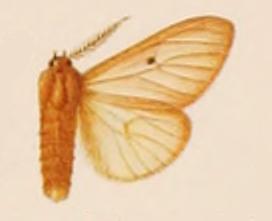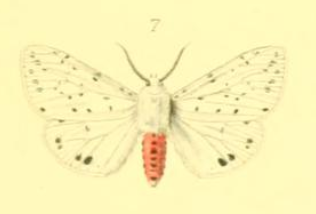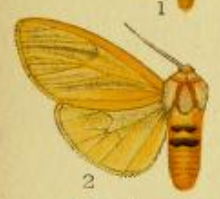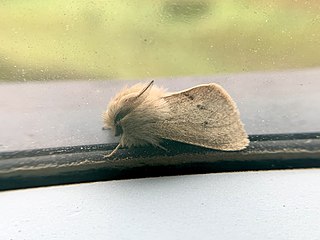
The buff ermine is a moth of the family Erebidae. It is sometimes placed in the genus Spilosoma. The species was first described by Johann Siegfried Hufnagel in 1766. It is found throughout the temperate belt of the Palearctic region south to northern Turkey, Georgia, Kazakhstan, southern Siberia, eastern Mongolia, Amur Region, China, Korea and Japan.

Spilosoma virginica is a species of moth in the subfamily Arctiinae. As a caterpillar, it is known as the yellow woolly bear or yellow bear caterpillar. As an adult, it is known as the Virginian tiger moth.

Spilosoma lubricipeda, the white ermine, is a moth of the family Erebidae. It is found throughout the temperate belt of Eurasia from Europe through Kazakhstan and southern Siberia to Amur Region, China, Korea and Japan. In China several sibling species occur.

Spilosoma urticae, the water ermine, is a moth of the family Erebidae. It is found in temperate belt of the Palearctic realm like similar Spilosoma lubricipedum, but prefers drier biotopes. So, S. urticae is more abundant in steppes and it is the single Spilosoma species in Central Asia.

Spilosoma pellucida is a moth of the family Erebidae. It was described by Walter Rothschild in 1910. It is found in Ghana.

Spilosoma curvilinea is a species of moth of the family Erebidae. It was described by Francis Walker in 1855. It is found in Cameroon, Republic of the Congo, Democratic Republic of the Congo, Ghana, Ivory Coast, Kenya, Nigeria, Senegal, Sierra Leone, Sudan, Tanzania, the Gambia and Uganda.
Spilosoma daitoensis is a moth in the family Erebidae. It was described by Shōnen Matsumura in 1930. It is found in Taiwan.
Spilosoma extrema is a moth in the family Erebidae. It was described by Franz Daniel in 1943. It is found in Yunnan, China.
Spilosoma ningyuenfui is a moth in the family Erebidae. It was described by Franz Daniel in 1943. It is found in China.

Spilosoma punctaria is a moth in the family Erebidae. It was described by Caspar Stoll in 1782. It is found in the Russian Far East, China, Korea, Taiwan and Japan.
Spilosoma yemenensis is a moth in the family Erebidae. It was described by George Hampson in 1916. It is found in Yemen.

Spilosoma pteridis, the brown tiger moth, is a moth in the family Erebidae. It was described by Henry Edwards in 1875. It is found in the United States in western Oregon and Washington, British Columbia and northern Idaho. The habitat consists of wet forests west of the Cascades, including coastal rainforests, low elevation mixed hardwood-conifer forests, as well as higher elevation conifer forests in the Cascades.
Spilosoma bipartita is a moth in the family Erebidae. It was described by Walter Rothschild in 1933. It is found in Angola, Congo, Kenya, Malawi, South Africa, Tanzania and Zimbabwe.
Spilosoma castelli is a moth in the family Erebidae. It was described by Walter Rothschild in 1933. It is found in Senegal and Nigeria.

Spilosoma occidens is a moth in the family Erebidae. It was described by Walter Rothschild in 1910. It is found in the Democratic Republic of the Congo, Ghana, Nigeria, Senegal and Sierra Leone.

Spilosoma togoensis is a moth in the family Erebidae. It was described by Max Bartel in 1903. It is found in Cameroon, the Central African Republic, the Democratic Republic of the Congo, Equatorial Guinea, Ghana, Ivory Coast, Nigeria and Togo.
Spilosoma latipennis, the pink-legged tiger moth, or the red-legged diacrisia, is a moth in the family Erebidae. It was described by Richard Harper Stretch in 1872. It is found in eastern North America, where it has been recorded from Georgia, Indiana, Iowa, Kansas, Kentucky, Maine, Maryland, New Brunswick, New York, North Carolina, Ohio, Ontario, Pennsylvania, South Carolina, West Virginia and Wisconsin.

Spilosoma vestalis, the Vestal tiger-moth, is a moth in the family Erebidae. It was described by Alpheus Spring Packard in 1864. It is found along the coast of western North America, from California north to the Kitsap Peninsula in Washington and western Idaho. The habitat consists of wet forests, moist forests, coastal rainforests, low elevation mixed hardwood forests and high elevation mixed conifer forests.

Spilosoma vagans, the wandering diacrisia or wandering tiger moth, is a moth in the family Erebidae. It was described by Jean Baptiste Boisduval in 1852. It is found in western North America, from southern California, southern Utah and central Colorado north to southern British Columbia and south-western Alberta. The habitat consists of drier forests, including open ponderosa pine forests and mixed hardwood-conifer forests.

Spilosoma metaleuca is a moth in the family Erebidae. It was described by George Hampson in 1905. It is found in the Democratic Republic of the Congo, Eritrea, Nigeria and Sudan.











